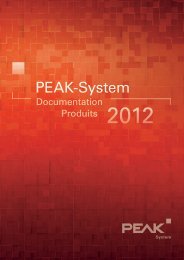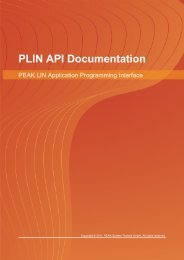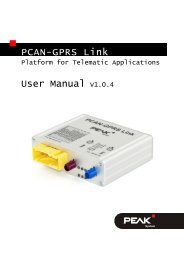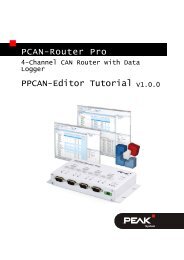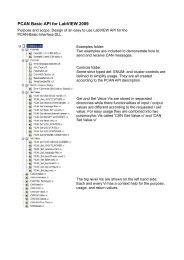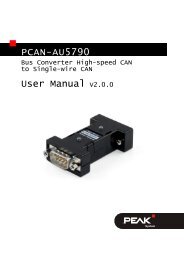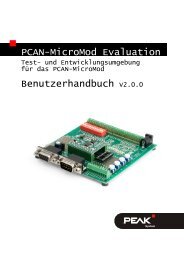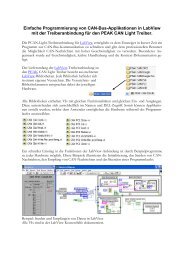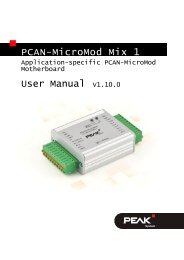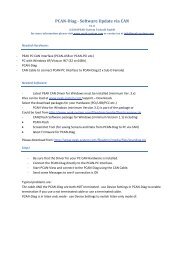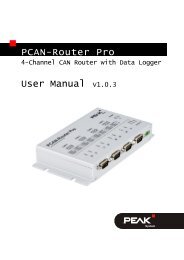PCAN-driver for Linux - PEAK-System
PCAN-driver for Linux - PEAK-System
PCAN-driver for Linux - PEAK-System
You also want an ePaper? Increase the reach of your titles
YUMPU automatically turns print PDFs into web optimized ePapers that Google loves.
<strong>PCAN</strong>-<strong>driver</strong> <strong>for</strong> <strong>Linux</strong><br />
Copyright (C) 2002 -2006 Peak <strong>System</strong>-Technik GmbH<br />
www.peak-system.com<br />
linux@peak-system.com<br />
and Klaus Hitschler<br />
klaus.hitschler@gmx.de<br />
<strong>PCAN</strong>-<strong>driver</strong> <strong>for</strong> <strong>Linux</strong> page 1 of 23
History of the document<br />
first draft Hi 13.01.2002<br />
rescue after loss of data Hi 10.02.2002<br />
<strong>for</strong>mat revision, read/write tables Hi 20.02.2002<br />
delete typographic mistakes Hi 21.02.2002<br />
<strong>PCAN</strong>-USB integrated Hi 09.02.2003<br />
obfuscation of „pcan_usb_kernel.c“ is described Hi 23.02.2003<br />
devfs, kernel-2.5 support, LGPL Hi 04.08.2003<br />
1 st revision <strong>for</strong> kernel 2.6.x Hi 02.05.2004<br />
enlarge FAQ, corrections Hi 13.05.2004<br />
simple correction <strong>for</strong> RPM make procedure Hi 14.08.2004<br />
additional compiler switches Hi 19.07.2005<br />
replaced cat “i ...” with echo “i ...” Hi 30.11.2005<br />
Added a hint from Uwe Bonnes about 'make scripts' Hi 14.03.2006<br />
Added <strong>PCAN</strong>-PC Card support, removed devfs Hi 14.05.2006<br />
Corrected serious typographic error Hi 16.05.2006<br />
removed obfuscation, added realtime support Hi 29.10.2006<br />
<strong>PCAN</strong>-<strong>driver</strong> <strong>for</strong> <strong>Linux</strong> page 2 of 23
table of documents<br />
Disclaimer..........................................................................................................................4<br />
Features of the 'pcan.o' or 'pcan.ko' <strong>driver</strong>.......................................................................4<br />
Features of the 'libpcan.so' library....................................................................................5<br />
Preluding notes..................................................................................................................5<br />
Installation with RPM.........................................................................................................6<br />
Installation of source RPM........................................................................................6<br />
Manual installation.............................................................................................................7<br />
Manual file unpacking ..............................................................................................7<br />
Specifics with the <strong>driver</strong> installation <strong>for</strong> <strong>PCAN</strong>-USB ................................................8<br />
Specifics with the <strong>driver</strong> installation <strong>for</strong> <strong>PCAN</strong>-PC Card..........................................8<br />
Manual installation of the <strong>driver</strong> ...............................................................................9<br />
Manual installation of the shared library.................................................................10<br />
Manual installation of the header-files....................................................................10<br />
Customization of 'modules.conf' or 'modprobe.conf'.......................................................11<br />
Initial bitrate.............................................................................................................11<br />
Semi-automatic installation with compilation..................................................................11<br />
Installation test, use of test programs.............................................................................12<br />
Most important header files ............................................................................................13<br />
Compilation of the <strong>driver</strong>.................................................................................................14<br />
Use cases ...............................................................................................................14<br />
Prerequisites <strong>for</strong> compilation of the sources..........................................................15<br />
Support <strong>for</strong> Cross-Compilation...............................................................................15<br />
Realtime support with Xenomai.......................................................................................16<br />
Installation...............................................................................................................16<br />
Compilation environment........................................................................................16<br />
Runtime environment..............................................................................................16<br />
Troubleshooting......................................................................................................17<br />
FAQs................................................................................................................................17<br />
Appendix..........................................................................................................................20<br />
Historical parts.................................................................................................................22<br />
devfs........................................................................................................................22<br />
Epilogue ..........................................................................................................................23<br />
<strong>PCAN</strong>-<strong>driver</strong> <strong>for</strong> <strong>Linux</strong> page 3 of 23
Disclaimer<br />
Part of this program is free software; you can redistribute it and/or modify it under the<br />
terms of the GNU General Public License or LGPL Lesser General Public License as<br />
published by the Free Software Foundation version 2 of the License. This program is<br />
distributed in the hope that it will be useful, but WITHOUT ANY WARRANTY; without<br />
even the implied warranty of MERCHANTABILITY or FITNESS FOR A PARTICULAR<br />
PURPOSE. See the GNU General Public License <strong>for</strong> more details.<br />
You should have received a copy of the GNU General Public License along with this<br />
program; if not, write to the Free Software Foundation, Inc., 59 Temple Place, Suite<br />
330, Boston, MA 02111-1307 USA<br />
It is strictly prohibited to use the intellectual property from the provided source<br />
code <strong>for</strong> developing or producing a 'compatible' hardware. All rights are reserved<br />
by Peak- <strong>System</strong>- Technik GmbH.<br />
Features of the 'pcan.o' or 'pcan.ko' <strong>driver</strong><br />
The „pcan.o“ or „pcan.ko“ <strong>driver</strong> is supporting <strong>PCAN</strong>-PCI, <strong>PCAN</strong>-ISA, <strong>PCAN</strong>-PC/104,<br />
<strong>PCAN</strong>-Dongle, <strong>PCAN</strong>-PC Card as well as <strong>PCAN</strong>-USB hardware. Depending on the<br />
type of hardware (PCI, ISA, Dongle, PC Card, USB) 8 channels <strong>for</strong> each type can be<br />
supported. For <strong>PCAN</strong>-ISA, <strong>PCAN</strong>-PC/104 and <strong>PCAN</strong>-Dongle the base address and the<br />
used interrupt are adjustable. If no parameters are provided then the <strong>driver</strong> uses<br />
factory defaults. A user program can communicate with the <strong>driver</strong> in two different ways:<br />
1. ASCII <strong>for</strong>matted data can be provided or accepted over a „read()“ or „write()“<br />
interface. This data contains in<strong>for</strong>mation from received or transmitted telegrams or<br />
about channel initializing parameters.<br />
2. With a „ioctl()“ interface. Through this interface user programs are able to receive<br />
and to transmit CAN-telegrams as well. However it is possible to get in<strong>for</strong>mation<br />
about the diagnosis of the channel status and to initialize the CAN-channel.<br />
The <strong>driver</strong> can be used from more than one user program at the same time and the<br />
simultaneous use of lots of interfaces and/or CAN channels is supported. If more than<br />
one user program communicates with the same CAN-channel the input or output is<br />
shared. (e.g.: Many user programs are accidentally sharing the received telegrams.)<br />
The reading or writing of telegrams can block if the receive buffer doesn't contain data<br />
any more or if the write buffer is full. This behaviour can be disabled by opening the<br />
path as non-blocking.<br />
The „select“-method is supported.<br />
The interface to the <strong>driver</strong> (constants and structures) is defined in the header file<br />
„pcan.h“.<br />
<strong>PCAN</strong>-<strong>driver</strong> <strong>for</strong> <strong>Linux</strong> page 4 of 23
Features of the 'libpcan.so' library<br />
The „libpcan.so“ library is providing an easier interface <strong>for</strong> using the properties of the<br />
<strong>PCAN</strong>-<strong>driver</strong>s. The library interface is similar to the ones from MS-Windows and make<br />
the porting of applications easier. There are also some calls which adapt better to the<br />
specifics of <strong>Linux</strong>. They are marked with a 'LINUX_..' as prefix. (Example: HANDLE<br />
LINUX_CAN_Open(char *szDeviceName, int nFlags);)<br />
Picture 1. calling hierarchy<br />
The interface of the library is described within the C/C++-header file „libpcan.h“. Please<br />
note that „libpcan.h“ includes the „pcan.h“ file.<br />
The source code is under LGPL so it is <strong>for</strong> utilizing within proprietary software without<br />
any exceptions.<br />
Preluding notes<br />
Note: Be<strong>for</strong>e installing the software the hardware has to be installed in or at the<br />
computer (Exception: <strong>PCAN</strong>-Dongle, <strong>PCAN</strong>-PC Card or <strong>PCAN</strong>-USB, see at (6*)).<br />
This manual is describing the installation process on a x86-<strong>Linux</strong>-computer with<br />
installed kernel 2.6.x. and a SuSE 10.0 system. Exceptions <strong>for</strong> kernel 2.2.x. 2.6.x and<br />
x86-RedHat systems are particularly mentioned.<br />
During the installation sometimes a console and perhaps an editor as well will be used<br />
in the „root“- mode. If you want to login as „root“ user within a console or xterm-session<br />
you can use the 'su' command or the built in menu „file/root console“.<br />
To start an editor in the „root“ – mode, just invoke from the menu<br />
„system/terminals/terminal (system manager mode)“ in KDE. From the console<br />
command line you can invoke the editor „kwrite“, „kate“ or „emacs“.<br />
For some distributions the standard path doesn't include the „/sbin“ folder. Then<br />
installation commands have to typed in with „/sbin/“ ahead.<br />
Examples:<br />
Application<br />
Shared library<br />
Driver<br />
<strong>PCAN</strong>-<strong>driver</strong> <strong>for</strong> <strong>Linux</strong> page 5 of 23
sbin/modprobe ... instead of modprobe ...<br />
/sbin/insmod ... instead of insmod ...<br />
/sbin/rmmod ... instead of rmmod ...<br />
/sbin/modinfo ... instead of modinfo ...<br />
Installation with RPM<br />
The installation comprise three files:<br />
Installation-en.pdf description in PDF <strong>for</strong>mat.<br />
peak-linux-<strong>driver</strong>-20040501-3.3.src.rpm the RPM-source-file.<br />
peak-linux-<strong>driver</strong>.3.3.tar.gz the packed tar-sources.<br />
(Note: The term <strong>for</strong> release or the version <strong>for</strong> file names can change.)<br />
The installation with RPM creates an installable RPM – package with standard settings<br />
<strong>for</strong> the local target system. If the standard settings don't fit you can do a manual<br />
installation.<br />
Installation of source RPM<br />
Please type in the command line (as „root“ user):<br />
rpm --rebuild peak-linux-<strong>driver</strong>-20040501-3.3.src.rpm<br />
or<br />
rpmbuild --rebuild peak-linux-<strong>driver</strong>-20040501-3.3.src.rpm<br />
if the file „peak-linux-<strong>driver</strong>-20040501-3.3.src.rpm“ is in your current directory.<br />
This invocation expects the previous installation of the gcc-compiler, the kernelheaders<br />
and the make tools.<br />
The translation with and <strong>for</strong> systems with kernel 2.6.x needs an additionally configured<br />
kernel and all of the kernel sources.<br />
At the successful end of this rebuild RPM is filing at:<br />
„/usr/src/packages/“ or „/usr/src/redhat“<br />
a system specific binary-installation <strong>for</strong> SuSE or RedHat in this folder. e.g.<br />
/usr/src/redhat/RPMS/i386/peak-linux-<strong>driver</strong>-20040501-3.3.i386.rpm<br />
Now you can do the installation of the binary package:<br />
rpm --install peak-linux-<strong>driver</strong>-20040501-3.3.i386.rpm<br />
Alternatively you can use the GUI based installers „kpackage“ in KDE or „gnorpm“ in<br />
GNOME, too.<br />
<strong>PCAN</strong>-<strong>driver</strong> <strong>for</strong> <strong>Linux</strong> page 6 of 23
Manual installation<br />
Manual file unpacking<br />
Unpack the file „peak-linux-<strong>driver</strong>.x.y.tar.gz“ into an optional folder into your home<br />
directory. Example:<br />
tar -xzf peak-linux-<strong>driver</strong>.3.3.tar.gz<br />
Within this directory you get following tree of files:<br />
/home/klaus/tmp/peak-linux-<strong>driver</strong>-3.3/<br />
|-- Documentation Any documentary<br />
| |-- COPYING GNU Public License<br />
| |-- Installation-en.pdf This installation instructions<br />
| |-- template.c<br />
| |-- template.h<br />
| |-- template.make<br />
| `-- todo.txt<br />
|-- Makefile A 'global' makefile<br />
|-- <strong>driver</strong> The <strong>driver</strong> and its sources<br />
| |-- Makefile The makefile <strong>for</strong> the <strong>driver</strong><br />
| |-- pcan.h Application interface definitions of the <strong>driver</strong><br />
| |-- pcan_make_devices A script <strong>for</strong> generating device nodes<br />
| |-- src The <strong>driver</strong> sources<br />
| | |-- cobf.h<br />
| | |-- pcan_common.h<br />
| | |-- pcan_dongle.c<br />
| | |-- pcan_dongle.h<br />
| | |-- pcan_fifo.c<br />
| | |-- pcan_fifo.h<br />
| | |-- pcan_fops.c<br />
| | |-- pcan_fops.h<br />
| | |-- pcan_isa.c<br />
| | |-- pcan_isa.h<br />
| | |-- pcan_main.c<br />
| | |-- pcan_main.h<br />
| | |-- pcan_parse.c<br />
| | |-- pcan_parse.h<br />
| | |-- pcan_pci.c<br />
| | |-- pcan_pci.h<br />
| | |-- pcan_sja1000.c<br />
| | |-- pcan_sja1000.h<br />
| | |-- pcan_usb.c<br />
| | |-- pcan_usb.h<br />
| | |-- pcan_usb_kernel.c<br />
| | `-- pcan_usb_kernel.h<br />
| |-- test.txt<br />
| `-- wstress<br />
|-- lib The access library<br />
| |-- Makefile The makefile of the library<br />
| |-- libpcan.h The library call prototypes<br />
| `-- src The sources of the library<br />
<strong>PCAN</strong>-<strong>driver</strong> <strong>for</strong> <strong>Linux</strong> page 7 of 23
| `-- libpcan.c<br />
`-- test The test programs<br />
|-- Makefile The makefile to the test programs<br />
|-- src The sources to the test programs<br />
| |-- bitratetest.c<br />
| |-- common.c<br />
| |-- common.h<br />
| |-- parser.cpp<br />
| |-- parser.h<br />
| |-- receivetest.c<br />
| `-- transmitest.cpp<br />
`-- transmit.txt Test transmit instructions<br />
Specifics with the <strong>driver</strong> installation <strong>for</strong> <strong>PCAN</strong>-USB<br />
For using the <strong>driver</strong> the USB subsystem of the <strong>Linux</strong> kernel has to be enabled. USB<br />
support <strong>for</strong> <strong>Linux</strong> was first introduced with kernel 2.4. The use of <strong>PCAN</strong>-USB together<br />
with a <strong>Linux</strong> kernel version less than 2.4.7 is deprecated through the <strong>driver</strong> developer.<br />
Specifics with the <strong>driver</strong> installation <strong>for</strong> <strong>PCAN</strong>-PC Card<br />
The user side of the PCMCIA subsystem of the kernel has undergone heavy changes<br />
through subsequent releases of kernel 2.6.x . So we have to distinguish between the<br />
implementations:<br />
Up from kernel 2.6.13 the vendor and card IDs are'nt any more registered in the<br />
configuration file “/etc/pcmia/config” since the relationship between manufacturer-ID<br />
and device-ID of the card and the associated <strong>driver</strong> is registered inside the <strong>driver</strong>. The<br />
<strong>driver</strong> should be loaded be<strong>for</strong>e card plugin.<br />
With this kernel versions you can use the pccardctl utility from the pcmcia-package,<br />
especially “pccardctl eject” and “pccardctl insert” to prepare a card <strong>for</strong> ejection or to<br />
notify a inserted card.<br />
For earlier kernel versions than 2.6.13 you need entries in “/etc/pcmcia/config” like:<br />
device “pcan”<br />
class “none” module “pcan”<br />
card “<strong>PCAN</strong>-PCCARD”<br />
manfid 0x0377, 0x0001<br />
bind “pcan”<br />
With this entries you can use your configured hotplug system to load the <strong>driver</strong> when<br />
the card is plugged in.<br />
With this kernel versions you can use the cardctl utility from the pcmcia-package,<br />
especially “cardctl eject” and “cardctl insert” to prepare a card <strong>for</strong> ejection or to notify a<br />
inserted card.<br />
Please note that removing a card with still open channels is not recommended. Support<br />
<strong>for</strong> kernel versions 2.4.x are not tested at the timing of writing.<br />
<strong>PCAN</strong>-<strong>driver</strong> <strong>for</strong> <strong>Linux</strong> page 8 of 23
Manual installation of the <strong>driver</strong><br />
Note: From the kernel version 2.6.0 on the kernel module extension is „ko“. This is why<br />
„pcan.o“ is named „pcan.ko“ from kernel 2.6.0 on.<br />
Register as „root“ user in a console e.g. konsole or xterm. Fork to the „.../peak-linux<strong>driver</strong>-x.y/<strong>driver</strong>“<br />
directory. Type in:<br />
/sbin/modprobe parport<br />
This command installs the „Parport Subsystem“ with <strong>Linux</strong>. It is necessary to support<br />
the <strong>PCAN</strong>-Dongle integration (1*, 2*). If the command exits without an error message<br />
please invoke<br />
/sbin/insmod pcan.o type=xxx,yyy,... io=0x300,0x378,... irq=10,7,...<br />
or from kernel 2.6.0 on:<br />
/sbin/insmod pcan.ko type=xxx,yyy,... io=0x300,0x378,... irq=10,7,...<br />
If you need USB support you have to do the same steps as in „Specifics with the <strong>driver</strong><br />
installation <strong>for</strong> USB-<strong>PCAN</strong>“. The place holder „xxx,yyy,...“ are standing <strong>for</strong> „isa“, “sp“ or<br />
„epp“. The parameter <strong>for</strong> „io“ and „irq“ can be left out, if the standard assignments are<br />
configured with your hardware. PCI-channels and USB-channels are found and<br />
installed without any special details but ISA (PC/104) and parallel-Port supported<br />
channels have to be registered.<br />
The standard assignments <strong>for</strong> ISA and PC/104 interfaces are (io/irq): 0x300/10,<br />
0x320/5<br />
The standard assignments <strong>for</strong> Dongle in SP/EPP mode are (io/irq): 0x378/7, 0x278/5<br />
With the following command you can see any error report (as „root“ user):<br />
tail /var/log/messages<br />
Normally the output looks similar to this:<br />
Jan 13 18:28:57 sylvia kernel: pcan: *Name: Release_20020113_a *<br />
Jan 13 18:28:57 sylvia kernel: pcan: pci device minor 0 found<br />
Jan 13 18:28:57 sylvia kernel: pcan: isa device minor 8 found (io=0x0300,irq=10)<br />
Jan 13 18:28:57 sylvia kernel: pcan: epp-dongle device minor 24 prepared (io=0x0378,irq=7)<br />
Jan 13 18:28:57 sylvia kernel: pcan: major 254.<br />
You can check the correct installation. Please invoke:<br />
cat /proc/pcan<br />
You get a similar printout if there are no errors:<br />
*----------- <strong>PEAK</strong>-<strong>System</strong>s CAN interfaces (www.peak-system.com) ------------<br />
*------------------------- Release_20060514_a ---------------------------<br />
*-------------------- 8 interfaces @ major 253 found ----------------------<br />
*n -type- ---base--- irq ---read--- ---write-- ---irqs--- --errors-- status<br />
0 pci 0xdb008000 5 0x00000000 0x00000000 0x00000000 0x00000000 0x0000<br />
1 pci 0xdb008400 5 0x00000000 0x00000000 0x00000000 0x00000000 0x0000<br />
8 isa 0x00000300 10 0x00000000 0x00000000 0x00000000 0x00000000 0x0000<br />
24 epp 0x00000378 7 0x00000000 0x00000000 0x00000000 0x00000000 0x0000<br />
32 usb 0x12340020 33 0x00000000 0x00000000 0x00000000 0x00000000 0x0000<br />
33 usb 0x12340021 34 0x00000000 0x00000000 0x00000000 0x00000000 0x0000<br />
40 pccard 0x00000180 169 0x00000000 0x00000000 0x00000000 0x00000000 0x0000<br />
41 pccard 0x000001a0 169 0x00000000 0x00000000 0x00000000 0x00000000 0x0000<br />
<strong>PCAN</strong>-<strong>driver</strong> <strong>for</strong> <strong>Linux</strong> page 9 of 23
The <strong>driver</strong> is configured <strong>for</strong> the dynamic allocation of the „major“ serial number (4*).<br />
This is why the device files have to be generated newly every time after <strong>driver</strong><br />
installation. Please invoke the shell script <strong>for</strong> this:<br />
./pcan_make_devices 2<br />
This script installs two device files <strong>for</strong> each PCI, ISA, Dongle Devices in SP and EPP<br />
mode (3*) and USB-devices. Please verify the result with the command:<br />
ls -l /dev/pcan*<br />
Now you already can do your first test with your CAN hardware. Just connect a CANtransmitter<br />
to your CAN interface and send telegrams with bit rate setting of 500<br />
kbit/sec . Login at a user-console and invoke:<br />
cat /dev/pcan0 <strong>for</strong> the first <strong>PCAN</strong>-PCI interface<br />
cat /dev/pcan8 <strong>for</strong> the first <strong>PCAN</strong>-ISA or <strong>PCAN</strong>-PC/104 interface<br />
cat /dev/pcan16 <strong>for</strong> the first <strong>PCAN</strong>-Dongle interface in SP-mode<br />
cat /dev/pcan24 <strong>for</strong> the first <strong>PCAN</strong>-Dongle interface in EPP-mode<br />
cat /dev/pcan32 <strong>for</strong> the first <strong>PCAN</strong>-USB interface (*9)<br />
cat /dev/pcan40 <strong>for</strong> the first <strong>PCAN</strong>-PC Card interface<br />
The received telegrams should be shown (5*). This invocation can be made at more<br />
than one console <strong>for</strong> more than one interface at the same time.<br />
The output of data is already possible. With the call of:<br />
echo „m s 0x234 2 0x11 0x22“ > /dev/pcan0<br />
<strong>for</strong> example a CAN telegram with standard frame is transmitted with the identifier<br />
0x234 and two data bytes „0x11“ and „0x22“ from the first <strong>PCAN</strong>-PCI interface. The bit<br />
rate of the interface can as well be set from the so called „write interface“.<br />
Manual installation of the shared library<br />
Please change to the directory „../peak-linux-<strong>driver</strong>-x.y/lib“. Login as „root“ user and<br />
invoke:<br />
cp libpcan.so.0.1 /usr/lib/libpcan.so.0.1<br />
ln -sf /usr/lib/libpcan.so.0.1 /usr/lib/libpcan.so.0<br />
ln -sf /usr/lib/libpcan.so.0 /usr/lib/libpcan.so<br />
This process is only necessary if you install this program <strong>for</strong> the first time or if you want<br />
to update the library. To use the test programs the library has to be installed.<br />
Manual installation of the header-files<br />
Please copy the header-files into the directory „/usr/include“ as “root” user as followed<br />
and customize the access rights.<br />
cp peak-linux-<strong>driver</strong>/<strong>driver</strong>/pcan.h /usr/include/pcan.h<br />
chmod 644 /usr/include/pcan.h<br />
cp peak-linux-<strong>driver</strong>/lib/libpcan.h /usr/include/libpcan.h<br />
chmod 644 /usr/include/libpcan.h<br />
<strong>PCAN</strong>-<strong>driver</strong> <strong>for</strong> <strong>Linux</strong> page 10 of 23
Customization of 'modules.conf' or 'modprobe.conf'<br />
For kernel version 2.6.x the role of the configuration file has been taken over by the<br />
'modprobe.conf' file. Both files are to find in „/etc“.<br />
At the end of the „/etc/modules.conf“ file („modprobe.conf“) a marked addition is added<br />
through the installation. The respective type and the eventually non-standard base<br />
addresses and interrupt numbers are to be given there, if the <strong>driver</strong> have to support the<br />
<strong>PCAN</strong>-ISA or <strong>PCAN</strong>-Dongle interfaces. (Have a look at the description about the<br />
manual installation of the <strong>driver</strong>)<br />
Note: As soon as there already is an entry with the word 'pcan' the current entry is not<br />
to be changed. If you wish to have a new entry you have to delete the old one first. To<br />
do that you have to use an editor as „root“ user.<br />
Installation of the <strong>driver</strong><br />
After rebuilding the sources and the following binary installation on your target<br />
computer it's enough to type in<br />
/sbin/modprobe pcan<br />
to install the <strong>driver</strong> and any other useful modules. Depending on your requirements you<br />
have to do this procedure every time you start your computer or your application.<br />
(This may be done in a start up script, too.)<br />
Initial bitrate<br />
To prevent a wrong initial bitrate when loading the <strong>driver</strong> we added a <strong>driver</strong> load<br />
parameter which sets the initial bitrate of the related interfaces. For example to set the<br />
initial bitrate to 1 Mbit/sec the syntax is:<br />
bitrate=0x0014<br />
In order to make this setting persistent you have to modify /etc/modules.conf or<br />
/etc/modprobe.conf (depending on your kernel version).<br />
Note: Please consider that all interfaces handled with this <strong>driver</strong> get the same initial<br />
bitrate. The corresponding (common) bitrate codes are:<br />
#define CAN_BAUD_1M 0x0014 // 1 Mbit/s<br />
#define CAN_BAUD_500K 0x001C // 500 kBit/s<br />
#define CAN_BAUD_250K 0x011C // 250 kBit/s<br />
#define CAN_BAUD_125K 0x031C // 125 kBit/s<br />
#define CAN_BAUD_100K 0x432F // 100 kBit/s<br />
#define CAN_BAUD_50K 0x472F // 50 kBit/s<br />
#define CAN_BAUD_20K 0x532F // 20 kBit/s<br />
#define CAN_BAUD_10K 0x672F // 10 kBit/s<br />
#define CAN_BAUD_5K 0x7F7F // 5 kBit/s<br />
Semi-automatic installation with compilation<br />
A semi-automatic installation with compilation can also be done with little ef<strong>for</strong>t. Unpack<br />
the tar.gz-files to „any-directory“ and start compilation and installation. Please note the<br />
prerequisites <strong>for</strong> compilation of the sources.<br />
cp peak-linux-<strong>driver</strong>.3.3.tar.gz <br />
cd any-directory<br />
tar -xzf peak-linux-<strong>driver</strong>.3.3.tar.gz<br />
<strong>PCAN</strong>-<strong>driver</strong> <strong>for</strong> <strong>Linux</strong> page 11 of 23
m peak-linux-<strong>driver</strong>.3.3.tar.gz<br />
cd peak-linux-<strong>driver</strong><br />
make clean<br />
make<br />
make install<br />
Installation test, use of test programs<br />
Two test programs are attached <strong>for</strong> the initial test of the interfaces. For using the<br />
programs please change to the directory „.../peak-linux-<strong>driver</strong>-x.y/test“. Please invoke<br />
„/receivetest --help“. You get following response:<br />
receivetest Version "Release_20040412_a" (www.peak-system.com)<br />
--------- Copyright (C) 2004 <strong>PEAK</strong> <strong>System</strong>-Technik GmbH --------receivetest<br />
comes with ABSOLUTELY NO WARRANTY. This is free<br />
software and you are welcome to redistribute it under certain<br />
conditions. For details see attached COPYING file.<br />
receivetest - a small test program which receives and prints CAN messages.<br />
usage: receivetest {[-f=devicenode] | {[-t=type] [-p=port [-i=irq]]}} [-b=BTR0BTR1] [-e] [-?]<br />
options: -f - devicenode - path to devicefile, default=/dev/pcan0<br />
-t - type of interface, e.g. 'pci', 'sp', 'epp', 'isa' or 'usb' (default: pci).<br />
-p - port in hex notation if applicable, e.g. 0x378 (default: 1st port of type).<br />
-i - irq in dec notation if applicable, e.g. 7 (default: irq of 1st port).<br />
-b - BTR0BTR1 code in hex, e.g. 0x001C (default: 500 kbit).<br />
-e - accept extended frames. (default: standard frames)<br />
-? or --help - this help<br />
receivetest: finished (0).<br />
The default bit-rate settings <strong>for</strong> all CAN-interfaces are set to 500 kbit/sec. The bit rate<br />
can be customized through the command line parameters.<br />
For using a ISA or Dongle interface with the standard settings following detail is<br />
enough:<br />
or<br />
receivetest -t=isa or receivetest -t=sp or receivetest -t=epp<br />
receivetest -f=/dev/pcan0<br />
to get to the first <strong>PCAN</strong>-PCI-interface.<br />
Every received telegram of the interface will be print out. Entering Ctrl-C cancels the<br />
program.<br />
The program „transmitest“ can be used to transmit data. Please invoke „./transmitest –<br />
help“. You get following output similar to receivetest:<br />
transmitest Version "Release_20040412_a" (www.peak-system.com)<br />
--------- Copyright (C) 2004 <strong>PEAK</strong> <strong>System</strong>-Technik GmbH --------transmitest<br />
comes with ABSOLUTELY NO WARRANTY. This is free<br />
software and you are welcome to redistribute it under certain<br />
conditions. For details see attached COPYING file.<br />
transmitest - a small test program which sends CAN messages.<br />
usage: transmitest filename {[-f=devicenode] | {[-t=type] [-p=port [-i=irq]]}} [-b=BTR0BTR1]<br />
[-e] [-?]<br />
options: filename - mandatory name of message description file.<br />
-f - devicenode - path to devicefile, default=/dev/pcan0<br />
-t - type of interface, e.g. 'pci', 'sp', 'epp' ,'isa' or 'usb' (default: pci).<br />
-p - port in hex notation if applicable, e.g. 0x378 (default: 1st port of type).<br />
-i - irq in dec notation if applicable, e.g. 7 (default: irq of 1st port).<br />
-b - BTR0BTR1 code in hex, e.g. 0x001C (default: 500 kbit).<br />
-e - accept extended frames. (default: standard frames)<br />
<strong>PCAN</strong>-<strong>driver</strong> <strong>for</strong> <strong>Linux</strong> page 12 of 23
-? or --help - this help<br />
transmitest: finished (0).<br />
This program expects similar parameters as receivetest with the exception of a file<br />
name. In the file with this name the program expects a list of telegram descriptions<br />
which are to be send. Those telegrams will be send cyclic until the ending by pressing<br />
Ctrl-C. The syntax of the description of the telegrams is:<br />
Tag / Column #1 Description<br />
m Message string follows<br />
r RTR-Message string follows<br />
i Initialisation string follows (write only)<br />
# Comment follows (write only)<br />
Description of the first column of the telegram of the read/write interface.<br />
Column Description<br />
2 s = Standard frame, e = Extended frame<br />
3 Identifier (hex)<br />
4 Length of telegram (dec)<br />
5..12 Telegram bytes (hex)<br />
13 Timestamp (dec, read only)<br />
13 Comment (write only)<br />
Description of the following columns of 'normal' and RTR-telegrams.<br />
Column Description<br />
2 BTR0BTR1 Init data (hex, write only)<br />
3 e = allow extended frames (write only)<br />
Description of the following columns <strong>for</strong> initializing strings.<br />
For example:<br />
# a comment<br />
# a message, standard frame, id=0x123, 0 Data bytes<br />
m s 0x123 0<br />
# a message, standard frame, id=0x123, 1 Data byte, Data<br />
m s 0x123 1 0x11<br />
# a message, standard frame, id=0x123, 1 Data byte, Data<br />
m s 0x123 2 0x11 0x22<br />
# a message, extended frame, id=0x123, 3 Data byte, Data<br />
m e 0x123 3 0x11 0x22 0x33<br />
# a RTR, standard frame, id=0x123, 0 Data byte, comment<br />
r s 0x123 0 # a comment<br />
# a RTR, extended frame, id=0x123, 0 Data byte, comment<br />
r e 0x123 0 # a comment<br />
# initialize<br />
i 0x1234 e<br />
Most important header files<br />
Any sources of the <strong>driver</strong>, of the library and the test programs are fit in underneath the<br />
<strong>PCAN</strong>-<strong>driver</strong> <strong>for</strong> <strong>Linux</strong> page 13 of 23
„peak-linux-<strong>driver</strong>-x.y“ directory tree. Two files are to be mentioned especially:<br />
The file „.../peak-linux-<strong>driver</strong>/<strong>driver</strong>/pcan.h“ describes the interface to the <strong>driver</strong> and<br />
command constants. You have to include this file if you want to have direct access to<br />
the <strong>driver</strong> with „open(), ioctl(), read(), close() etc.“.<br />
The file „.../peak-linux-<strong>driver</strong>/lib/libpcan.h“ describes the interface to the dynamic<br />
linkable library libpcan.so. You have to include this file if your application needs to use<br />
the dynamic library.<br />
Please note that libpcan.h is including the pcan.h file.<br />
Compilation of the <strong>driver</strong><br />
Use cases<br />
In some cases of using the installed <strong>driver</strong> it doesn't fit to the configured operating<br />
system. This could be following cases:<br />
1. Your kernel sources are not to be found in the standard directory „/usr/src/linux“. You<br />
still can compile with following invocations:<br />
cd ~/peak-linux-<strong>driver</strong>/<strong>driver</strong><br />
make clean<br />
make KERNEL_LOCATION=<br />
2. You don't need or don't want support <strong>for</strong> some interface types. Then you have to<br />
compile the <strong>driver</strong> with disabled support <strong>for</strong> some interfaces. The makefile provides<br />
to enable or disable partial compilation with this switches:<br />
USB = USB_SUPPORT or NO_ USB_SUPPORT<br />
PCI = PCI_SUPPORT or NO_ PCI_SUPPORT<br />
DNG = DONGLE_SUPPORT or NO_ DONGLE_SUPPORT<br />
ISA = ISA_SUPPORT or NO_ ISA_SUPPORT<br />
As default all interfaces are enabled. For example if you want to suppress <strong>PCAN</strong>-<br />
Dongle and <strong>PCAN</strong>-ISA Interfaces you have to compile:<br />
cd ~/peak-linux-<strong>driver</strong>/<strong>driver</strong><br />
make clean<br />
make DNG=NO_ DONGLE_SUPPORT ISA=NO_ ISA_SUPPORT<br />
3. The following section only applies to kernel versions 2.4.x or smaller: The <strong>driver</strong> is to<br />
be installed on RedHat <strong>Linux</strong>. RedHat in contrast to SuSE as default uses the<br />
„CONFIG_MODVERSIONS“ modifier to prohibit the installation of improper <strong>driver</strong>s. If<br />
your operating system was generated with enabled „CONFIG_MODVERSIONS“ you<br />
can see this easily by invoking „cat /proc/ksyms“. If there are cryptic number-letter<br />
combinations at the end of the symbols your system was generated with<br />
enabled„CONFIG_MODVERSIONS“.<br />
A simple new compilation on your system is enough:<br />
cd ~/peak-linux-<strong>driver</strong>/<strong>driver</strong><br />
<strong>PCAN</strong>-<strong>driver</strong> <strong>for</strong> <strong>Linux</strong> page 14 of 23
make clean<br />
make<br />
4. Your operating system doesn't support the PARPORT_SUBSYSTEM or you have a<br />
parallel interface which is unknown to the operating system and you like to use a<br />
<strong>PCAN</strong>-Dongle with this interface.<br />
Here you have to compile with the „PAR=NO_PARPORT_SUBSYSTEM“ switch:<br />
cd ~/peak-linux-<strong>driver</strong>/<strong>driver</strong><br />
make clean<br />
make PAR=NO_PARPORT_SUBSYSTEM<br />
5. You get runtime errors and want to see more in<strong>for</strong>mation <strong>for</strong> diagnosis at<br />
„/var/log/messages“. Here you have to translate with the „DBG=DEBUG“ switch:<br />
cd ~/peak-linux-<strong>driver</strong>/<strong>driver</strong><br />
make clean<br />
make DBG=DEBUG<br />
Combinations of these switches are also possible.<br />
Prerequisites <strong>for</strong> compilation of the sources<br />
Be<strong>for</strong>e compiling following prerequisites have to be considered:<br />
1. Up from kernel version 2.6.x the completely configured kernel sources <strong>for</strong> your<br />
target system have to be installed. If it is a standard installation the sources are<br />
located under „/usr/src/linux“ in which this normally is a link e.g. to „/usr/src/linux-<br />
2.6.6“. For every kernel smaller or equal than 2.4.x only the „kernel-headers“ have to<br />
be installed. (It's not wrong to install the complete sources of the target system.) The<br />
kernel-headers are installed if the invocation of “cat /lib/modules/'uname<br />
-r'/build/include/linux/modversions.h“ is ending without an error. (“'uname -r'“ is a<br />
place holder <strong>for</strong> the result of the invocation “uname -r“.)<br />
2. The “/lib/modules/'uname -r'/build/include/linux/version.h“ file has to exist or being<br />
copied be<strong>for</strong>e from the path “/boot/vmlinuz.version.h“.<br />
3. Tools like make, gcc, etc. have to be installed. (To edit or investigate <strong>for</strong>eign source<br />
codes I like to use the source navigator of RedHat.<br />
http://www.source<strong>for</strong>ge.net/projects/sourcenav )<br />
Support <strong>for</strong> Cross-Compilation<br />
The <strong>driver</strong>, its library and the test programs sometimes are used on other systems than<br />
the development system. The process of generating the binary <strong>driver</strong> <strong>for</strong> another target<br />
is called Cross-Compilation. Partially the <strong>driver</strong> and its helper programs are supporting<br />
Cross-Compilation. There<strong>for</strong>e the <strong>driver</strong> has to be translated with the option.<br />
make KERNEL_LOCATION=<br />
Whether the <strong>driver</strong> can be compiled <strong>for</strong> every possible target system and is working<br />
there can't be guaranteed because of so many different architectures.<br />
The installation of the <strong>driver</strong> and the library on an other target than the host system<br />
<strong>PCAN</strong>-<strong>driver</strong> <strong>for</strong> <strong>Linux</strong> page 15 of 23
can't be supported through the given installation scripts.<br />
We are glad about hints how to improve the Cross-Compilation support.<br />
Realtime support with Xenomai<br />
Since Release 'release_20061029_*' realtime support <strong>for</strong> the Xenomai realtime<br />
environment (http://www.xenomai.org/) was merged from a previous rt-branch into the<br />
main branch. Most of the work was done by Laurent Bessard and Edouard Tisserant.<br />
The Xenomai project has been launched in August 2001. It has merged in 2003 with<br />
the RTAI project [http://www.gna.org/projects/rtai/] to produce an industrial-grade<br />
real-time Free Software plat<strong>for</strong>m <strong>for</strong> GNU/<strong>Linux</strong> called RTAI/fusion, on top of<br />
Xenomai's abstract RTOS core.<br />
Installation<br />
First of all, in order to install pcan-rt <strong>driver</strong>, a Xenomai realtime environement must be<br />
installed on your workstation. Download the Xenomai sources from the Xenomai<br />
website and install it by following the installation manual provided. The <strong>Linux</strong> kernel of<br />
your workstation must be patched <strong>for</strong> using Adeos (patches <strong>for</strong> a lot of architectures are<br />
included in the source code).<br />
Don't <strong>for</strong>get to update your list of dynamic libraries by using 'ldconfig'.<br />
Compilation environment<br />
To compile the pcan realtime <strong>driver</strong>, you must provide in the make command the option<br />
RT=XENOMAI. By default, pcan_<strong>driver</strong> will be compiled <strong>for</strong> non-realtime environment.<br />
Don't try to compile pcan realtime <strong>driver</strong> with USB_SUPPORT or PCC_SUPPORT, they<br />
are still not supported.<br />
A example of command <strong>for</strong> compiling pcan realtime <strong>driver</strong>:<br />
cd ~/peak-linux-<strong>driver</strong>/<strong>driver</strong><br />
make clean<br />
make RT=XENOMAI<br />
Runtime environment<br />
You can load pcan realtime <strong>driver</strong> module as usual, there are no changes.<br />
The pcan API is the same in realtime and non-realtime, so you can open, close, read<br />
from or write to your pcan device like usual. But be careful, this must be made in a<br />
realtime task. For an example of how to use Xenomai <strong>for</strong> creating and using a realtime<br />
task, please refer to the examples (transmitest and receivetest) located in the 'test'<br />
folder.<br />
Don't <strong>for</strong>get to include in the Xenomai libraries and flags when compiling your program.<br />
Xenomai flags can't be obtained by using the 'xeno-config' script provided. You can<br />
have an example of how using 'xeno-config' in the 'Makefile' file located in the 'test'<br />
folder.<br />
<strong>PCAN</strong>-<strong>driver</strong> <strong>for</strong> <strong>Linux</strong> page 16 of 23
Troubleshooting<br />
Warning: We had had a problem with a old station that makes the kernel couldn't load.<br />
To solve this problem, we have added 'lapic=1' in the 'grub.conf' file.<br />
If your kernel still crashes at start, we recommend you to compile your kernel with<br />
Xenomai support in module and try to insert it after kernel was loaded. It will then<br />
indicate in the log messages what is the problem.<br />
The most common mistake when using a realtime tasks is trying to print some text in<br />
the user terminal. It is highly recommended to avoid to do that. In most cases, it will<br />
result in a kernel crash.<br />
FAQs<br />
Q. The <strong>driver</strong> <strong>for</strong> my <strong>PCAN</strong>-ISA card is not being installed. What's wrong?<br />
A. One possibility is that the SJA-1000 chip on the card is setting back while checking<br />
the PeliCAN-mode. If the card with a PLD that has got a red point and the jumper JP11<br />
is set „on“ this may be the reason. Remedy: To set the jumper to „off“.<br />
Q. My <strong>PCAN</strong>-ISA, OCAN-PC/104 or <strong>PCAN</strong>-Dongle doesn't receive any data though I<br />
can send. What's wrong?<br />
A. A possible reason is that a wrong interrupt is configured <strong>for</strong> the device. Then single<br />
telegrams can be send however none can be received. Not only the wrong assertion of<br />
the interrupt number but often the missing release of the interrupt in BIOS („legacy<br />
ISA“) <strong>for</strong> the <strong>PCAN</strong>-ISA card can be the reason. (See also (1*))<br />
Q. My <strong>PCAN</strong>-Dongle is being rejected while using it even if the installation was<br />
successful. What's wrong?<br />
A. Normally the reason is a not assigned interrupt <strong>for</strong> the „parport_pc“ while using it<br />
together with the PARPORT_SUBSYSTEM (1*).<br />
Q. What possibilities do I have to diagnose if I have problems?<br />
A. <strong>Linux</strong> has a variety of choices. First it's useful to look at recent messages with:<br />
“tail -f /var/log/messages“<br />
If the <strong>driver</strong> is loaded you can see (as root) with<br />
„/sbin/lsmod | grep pcan“<br />
More in<strong>for</strong>mations about the parameter of the <strong>driver</strong> can be asked with.<br />
„/sbin/modinfo pcan“<br />
Closer in<strong>for</strong>mation about assignment of major- and minor-numbers and about the use<br />
of resources can be queried with<br />
“cat /proc/pcan“<br />
In<strong>for</strong>mation about assignment of resources can be queried with<br />
<strong>PCAN</strong>-<strong>driver</strong> <strong>for</strong> <strong>Linux</strong> page 17 of 23
“cat /proc/interrupts“<br />
“cat /proc/ioports“<br />
“cat /proc/iomem“<br />
„cat /proc/pci“ or „cat /proc/bus/pci/devices“ depending on the kernel version.<br />
„cat /proc/bus/usb/devices“<br />
Please note that the interrupts of the hardware aren't registered until its use.<br />
To diagnose USB there are also programs with a graphical user interface like e.g.<br />
„USBView“.<br />
With garbled installations sometimes paths <strong>for</strong> translation of the <strong>driver</strong> are set wrong.<br />
That's why while translating the <strong>driver</strong> a message like this appears:<br />
*** Host machine kernel version=2.4.18-4GB, Driver kernel version=2.6.5, \<br />
Path to kernel sources=/mnt/usr/src/linux, use KBUILD=yes<br />
With this message it is possible to compare if the <strong>driver</strong> is really translated <strong>for</strong> the used<br />
kernel. The „KBUILD“ mechanism is used from kernel 2.6.x on.<br />
Q. How do I interpret the output of “cat /proc/pcan“ ?<br />
A. The second line gives in<strong>for</strong>mation about the release of the <strong>driver</strong>. In the third line the<br />
number of the found CAN-channels and the assigned major-number are shown. From<br />
line four on the characteristics of the each CAN-channel are described.<br />
The first column shows the minor-number assignment of the channel, the second<br />
column shows the type of the channel, the third and fourth column the assignment to<br />
base addresses (ports) and interrupt-numbers. The following four columns count the<br />
number of processed read-, write-, interrupt- and errors transactions. The last column<br />
shows the last occurred error status of the channel. The status is a bit-field with an<br />
interpretation like this table:<br />
Bit Description<br />
0 Chip-send-buffer full<br />
1 Chip-receive-buffer overrun<br />
2 BUS warning<br />
3 BUS passive<br />
4 BUS Off<br />
5 Receive-buffer is empty<br />
6 Receive-buffer overrun<br />
7 Send-buffer is full<br />
14 Illegal parameter<br />
Both columns „base“ and „ir“ are misused with USB channel types. „base“ is showing<br />
the serial number of the module and „ir“ the programmed device number of the module.<br />
The column „irqs“ in case of type 'usb' counts the number of received or sent USBpackages..<br />
Q. What happens if I plug out the interface while using <strong>PCAN</strong>-USB?<br />
<strong>PCAN</strong>-<strong>driver</strong> <strong>for</strong> <strong>Linux</strong> page 18 of 23
A. First of all your programs will stall and a re-plug-in of the <strong>PCAN</strong>-USB doesn't change<br />
anything. First you have to stop the <strong>PCAN</strong>-USB using programs and after plugging-in of<br />
the interface you can invoke your programs again. It's not guaranteed that the same<br />
minor number as the previous <strong>PCAN</strong>-USB minor-number is allocated. Minor-number<br />
assignment depends on the order of plug-ins of <strong>PCAN</strong>-USB devices.<br />
Q. How can I find out what minor-number the <strong>PCAN</strong>-USB is assigned to?<br />
A. With help of the individual pre-programmed „device-number“, which can be<br />
experienced with help of the „/proc/pcan“ interface, a relationship to a special physical<br />
connection can be made.<br />
Q. I want to open my <strong>PCAN</strong>-USB device however I get an error message. What's<br />
wrong?<br />
A. There is more than one possibility: 1.) The appropriate device is not registered as<br />
„/dev/pcan...“. 2.) The appropriate device is not plugged in.<br />
Q. The translation on my system doesn't work. What can be wrong?<br />
A. The most common reason are not installed <strong>Linux</strong> kernel sources. Often sources of<br />
another kernel than the one installed are used. Sometimes both files<br />
„/boot/vmlinuz.autoconf.h“ and<br />
„/boot/vmlinuz.version.h“<br />
of the distribution are not linked to the files they are assigned to.<br />
„/lib/modules/'uname-r'/build/include/linux/autoconf.h“ and<br />
„/lib/modules/'uname -r'/build/include/linux/version.h“<br />
Q. The transmission per<strong>for</strong>mance of CAN-messages is low, if I send a telegram with<br />
help of the write-interface out of a script. What is the problem?<br />
A. Every line in a script opens the path to a device and immediately closes this path<br />
again. This opening and closing takes time. The transmission per<strong>for</strong>mance can be<br />
improved by letting another path open. For example:<br />
cat /dev/pcan32 >/dev/null &<br />
echo „m s 0x123 2 0x11 0x12“ > /dev/pcan32<br />
echo „m s 0x123 2 0x11 0x12“ > /dev/pcan32<br />
Q. During installation of the <strong>driver</strong> with USB-support I get following message: „Warning:<br />
loading pcan.o will taint the kernel: non-GPL license – Proprietary“. What's the<br />
meaning of this message?<br />
A. This message points out that the <strong>driver</strong> <strong>for</strong> the <strong>PCAN</strong>-USB module is not released<br />
under the GPL license. The use of the <strong>driver</strong> as a module within <strong>Linux</strong> though is legal.<br />
Q. The source code module „pcan_usb_kernel.c“ only contains cryptic letters. Is the file<br />
destroyed?<br />
A. No, the contents of the files are obfuscated to save intellectual property. Though it's<br />
still a translatable source code. This feature does only apply <strong>for</strong> releases earlier than<br />
20061029.<br />
Q. While translating kernel 2.6.x following warning appears:<br />
<strong>PCAN</strong>-<strong>driver</strong> <strong>for</strong> <strong>Linux</strong> page 19 of 23
*** Warning: Overriding SUBDIRS on the command line can cause<br />
*** inconsistencies<br />
Is something not right?<br />
A. I am afraid that the discussion within the kernel-developer community about the right<br />
way of translating external modules hasn't found an end until this release. The current<br />
way generates this warning and at worst translates all of the modules again. Though<br />
there are approaches that the generation of external modules like pcan.ko is getting<br />
easier. This message can be ignored.<br />
Q. I got a lot of error messages when compiling the <strong>driver</strong> <strong>for</strong> a kernel 2.6.x system.<br />
What's wrong?<br />
A. To compile <strong>for</strong> kernel 2.6 target system you need to have a pre-configured kernel.<br />
To accomplish this you need to install the target kernel sources. Then do<br />
cd /usr/src/linux # <strong>for</strong> example<br />
su # you need to be root<br />
make cloneconfig # create a configuration suitable <strong>for</strong> your running kernel<br />
make scripts # create the necessary scripts<br />
That's all. Now you can – as ordinary user – compile your <strong>driver</strong>.<br />
Q. While translating the <strong>driver</strong> following message appears:<br />
*** "Can't find /usr/src/linux-2.4.24.SuSE/include/linux/version.h !". End.<br />
What's the problem?<br />
A. Within the <strong>driver</strong> makefile up from version 3.3 the target kernel version is not being<br />
won out of the interpretation of the command 'uname -r', but extracted out of contents<br />
of the file „$(KERNEL_LOCATION)/include/linux/include/version.h“. (If there wasn't<br />
any special „KERNEL_LOCATION“ given at the command line of „make“<br />
„KERNEL_LOCATION=/usr/src/linux“ is being used as default.) While translating the<br />
kernel sources the file „version.h“ is generated. Normally this message has its cause<br />
in not translated kernel sources. Until kernels 2.4.x it was enough if the distribution had<br />
installed this file. From kernel 2.6.x on it is necessary that the kernel sources <strong>for</strong> the<br />
target system are configured and translated completely. Then the file „version.h“ is<br />
being created.<br />
Q. I like to have interrupt sharing with <strong>PCAN</strong>-ISA or <strong>PCAN</strong>-PC/104<br />
A. No problem since version 3.30 of the <strong>driver</strong>. But you should be aware that interrupt<br />
sharing with ISA BUS is only possible with devices which are supported from the same<br />
<strong>driver</strong>, e.g. the pcan <strong>driver</strong>. For example it is not possible to share a serial device with a<br />
pcan device but two pcan devices can share the same interrupt level.<br />
Q. I got other questions or problems with the <strong>driver</strong>.<br />
A. Please consult linux@peak-system.com.<br />
Q. I am enthusiastic about the <strong>driver</strong> or the documentation and want to contribute<br />
something to make it better. Who do I have to consult?<br />
A. Please also contribute linux@peak-system.com. Peak and the author are happy<br />
about every positive response.<br />
Appendix<br />
(1*) = The „Parport Subsystem“ has to be configured to use a interrupt. There<strong>for</strong>e<br />
following lines have to be entered into the file „/etc/modules.conf“ or<br />
<strong>PCAN</strong>-<strong>driver</strong> <strong>for</strong> <strong>Linux</strong> page 20 of 23
„/etc/modprobe.conf“ depending on your kernel version:<br />
alias parport_lowlevel parport_pc<br />
options parport_pc io=0x378 irq=7<br />
Normally „irq=none“ stands in the „options“-line. The assigned interrupt number must<br />
match the assigned interrupt number of the device. Those works can only be done as<br />
'root“. If the „Parport Subsystem“ is already installed it can be removed with:<br />
rmmod lp and/or rmmod pcan<br />
rmmod parport_pc<br />
rmmod parport<br />
(2*) = You are not <strong>for</strong>ced to use the „Parport Subsystem“. Then the alternately use of<br />
the parallel port through <strong>PCAN</strong>-Dongle and e.g. a printer is not possible any more. For<br />
it the <strong>driver</strong> has to be translated with the PAR=NO_PARPORT_SUBSYSTEM option.<br />
Then the previous detail of „modprobe parport“ is not necessary while installing.<br />
(3*) = For each type of hardware 8 device-interfaces are reserved. For PCI those are<br />
the minor-numbers 0...7, <strong>for</strong> ISA 8...15, <strong>for</strong> Dongle in SP-mode 16...23 and <strong>for</strong> Dongle<br />
in EPP-mode 24...31, <strong>for</strong> <strong>PCAN</strong>-USB 32..39. There<strong>for</strong>e the device files have a name<br />
e.g.:<br />
/dev/pcan0 <strong>for</strong> the first PCI-channel<br />
/dev/pcan8 <strong>for</strong> the first ISA-channel<br />
/dev/pcan16 <strong>for</strong> the first SP-channel<br />
/dev/pcan24 <strong>for</strong> the first EPP-channel<br />
/dev/pcan32 <strong>for</strong> the first USB-channel (9*)<br />
The invocation of „pcan_make_devices n“ however only creates n device files of each<br />
type. According to your demands „n“ can be any number from 1...8.<br />
(4*) = In some cases the dynamic assignment of „major“- device numbers are<br />
unwelcome. However this can be changed in the <strong>driver</strong> sources (file „pcan_main.h“,<br />
constant „<strong>PCAN</strong>_MAJOR“). Afterwards the <strong>driver</strong> has to be translated and installed<br />
again. The best is to use the number „91“. This already is intended <strong>for</strong> CAN-devices.<br />
Please note that conflicts to other installed CAN-<strong>driver</strong>s can be possible.<br />
(5*) = The „read“- and „write“-interface of the <strong>driver</strong> print out ASCII <strong>for</strong>matted data or<br />
accept ASCII <strong>for</strong>matted data as input. The <strong>for</strong>mat of the telegrams <strong>for</strong> „read“ and „write“<br />
is defined identically, so that a redirection of data is possible:<br />
cat /dev/pcan0 > /dev/pcan8<br />
The <strong>for</strong>mat of the data is like the previously mentioned description of the telegrams.<br />
Additionally to the description of the telegrams the „read“-output supplies a time stamp<br />
in milliseconds. If there is a redirection like above the time stamp is being ignored.<br />
The „write“-output also accepts details about initializing:<br />
echo „i 0x1234 e“ > /dev/pcan8<br />
<strong>PCAN</strong>-<strong>driver</strong> <strong>for</strong> <strong>Linux</strong> page 21 of 23
The first parameter pinpoints the initialization, the second parameter names an input<br />
value <strong>for</strong> both BTR0/BTR1 registers of the SJA1000 chip. The optional third parameter<br />
„e“, enables the accept ion of extended frames.<br />
Naturally a faster „ioctl()“-interface is also defined.<br />
(6*) = CAN hardware is only accepted based on Philips chip SJA1000. <strong>PCAN</strong>-ISA or<br />
-PCI hardware is immediately verified during installation. In contrast to that the <strong>PCAN</strong><br />
-Dongle hardware is not verified until an „open()“ call. That's the reason why no error is<br />
reported if a parallel port without plugged-in <strong>PCAN</strong>-Dongle is recognized .<br />
(7*) = Sometimes some hardware/software combinations don't recognize the USB-<br />
Dongle after a new start of the system. The red light-emitting diode doesn't shine at the<br />
<strong>PCAN</strong>-USB if that's the case.<br />
(8*) = If lots of faults are generated with enabled USB support while translating, then a<br />
faulty <strong>Linux</strong> kernel configuration may be the cause. During configuration of the <strong>Linux</strong><br />
kernel the USB-support has to be enabled.<br />
(9*) = From kernel version 2.6 on the behaviour during assignment of the<br />
„minor“-numbers is being changed through the kernel parameter<br />
„CONFIG_USB_DYNAMIC_MINORS“. When „CONFIG_USB_DYNAMIC_MINORS“ is<br />
set, the first free „minor“-number is assigned to from 0 on. Mandrake distributions uses<br />
this configuration.<br />
Historical parts<br />
devfs<br />
Up from Release_20030622_x the device file system is being supported optionally.<br />
From kernel version 2.6.x the kernel developers depreciate the use of devfs so <strong>for</strong> the<br />
time being the <strong>driver</strong> is not supporting this. Up from release release_20060501_a<br />
(version 4.0) the parts <strong>for</strong> supporting devfs are removed from the <strong>driver</strong>.<br />
Using the devfs it's not necessary to create device files manually any more. This is<br />
taken over by the kernel in cooperation with the <strong>driver</strong> and the daemon devfsd. The<br />
device file system has to be enabled within the kernel.<br />
Compiling <strong>for</strong> devfs-file system support. If you translate the sources <strong>for</strong> a system with<br />
devfs-support (CONFIG_DEVFS_FS = y) this will be considered automatically:<br />
cd ~/peak-linux-<strong>driver</strong>/<strong>driver</strong><br />
make clean<br />
make DEVFS=DEFS_SUPPORT<br />
Q. I translated <strong>for</strong> device file system support. Though it's not working.<br />
A. Is your devfsd – the „device file system daemon“ – active? Please check that.<br />
<strong>PCAN</strong>-<strong>driver</strong> <strong>for</strong> <strong>Linux</strong> page 22 of 23
Epilogue<br />
This document was made with help of OpenOffice.org (http://www.openoffice.org).<br />
Thanks to the community <strong>for</strong> such an excellent tool.<br />
<strong>Linux</strong>, SuSE, RedHat, Mandrake, Windows are trademarks of the appropriate owners.<br />
<strong>PCAN</strong>-<strong>driver</strong> <strong>for</strong> <strong>Linux</strong> page 23 of 23


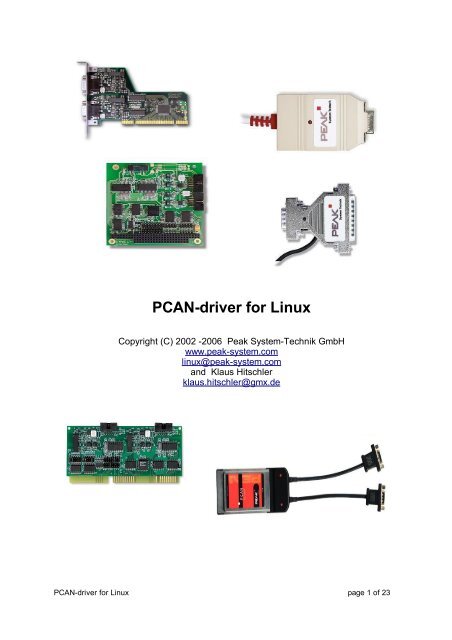
![English - Low Quality [7.2 MB] - PEAK-System](https://img.yumpu.com/5931738/1/184x260/english-low-quality-72-mb-peak-system.jpg?quality=85)
